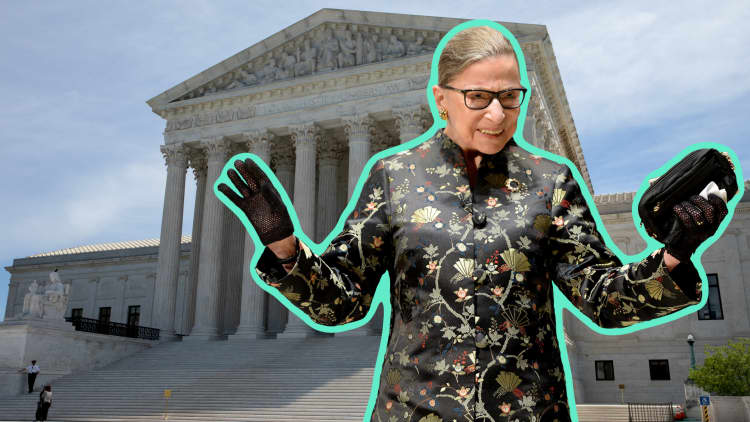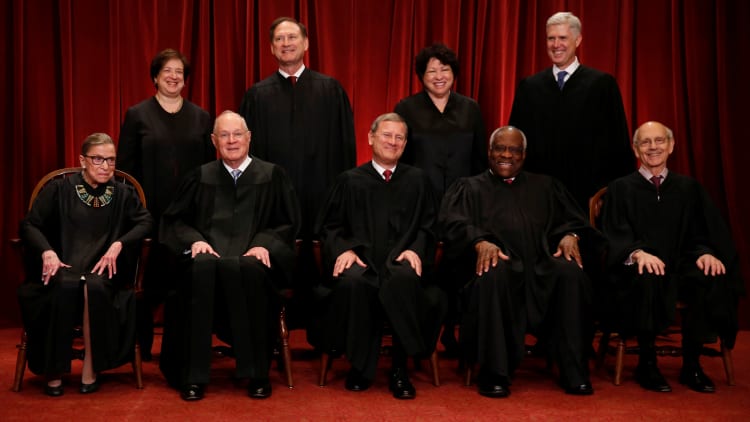Supreme Court Justice Ruth Bader Ginsburg is on the mend after another health scare, but that hasn't stopped political operatives and those on Capitol Hill from laying the groundwork for an unprecedented battle set to ensue if she leaves the bench ahead of the 2020 presidential election.
Both sides are preparing for an election-year fight that could dwarf last year's contentious confirmation of Justice Brett Kavanaugh, who was dogged by allegations of sexual misconduct.
With Kavanaugh in the rearview mirror and two Trump appointees on the nine-member panel, conservatives are salivating over the prospect of replacing their first Democratic-appointed justice during the Trump presidency — and liberals say the stakes have never been more clear.

Adding to the anticipation is the possible nomination of Amy Coney Barrett, widely seen as President Donald Trump's most likely next pick. Barrett, a young conservative Catholic who has tangled with Sen. Dianne Feinstein of California, was the favorite of social conservatives who believed last year that Kavanaugh was not a reliable enough vote on abortion.
"If it's before Election Day, it's going to be all out war. It's going to make Kavanaugh look like Triple A [baseball]," a GOP strategist with knowledge of the talks told CNBC, speaking on condition of anonymity in order to discuss the situation candidly. "I think people recognize its going to be brutal and I think people recognize as close to the Election Day, there's very little room for failure."
That description echoes what many in Washington are preparing for if Ginsburg retires prior to the 2020 election. This account is based on interviews with White House advisors, Republican donors, leaders of activist groups, independent court observers and congressional aides.
The deliberations among Republicans came before the top court announced last Friday that the 86-year-old Ginsburg, the most senior member of the court's liberal wing, completed a three-week course of radiation therapy for a tumor found on her pancreas.
Republican members of the Judiciary Committee have been reviewing likely nominees, including Barrett, but these lawmakers have privately fretted over whether it's worth the political fight to nominate someone too close or during an election, if there were an opening on the Supreme Court, aides said.
Senate Majority Leader Mitch McConnell has said he would fill a vacancy on the court in the 2020 election cycle, prompting charges of hypocrisy because of the Kentucky Republican's refusal to allow a vote on Judge Merrick Garland, President Barack Obama's nominee in 2016.
Ginsburg has previously been treated for pancreatic and colon cancers, and in December underwent surgery to remove cancerous growths on her lungs. Despite those setbacks, Ginsburg has regularly bounced back and has said she has no intention of retiring any time soon.
The White House, Senate Judiciary Committee and the Supreme Court did not return requests for comment. Ginsburg did not respond to a request for comment submitted to a court spokeswoman.
'People know what the stakes are'
Though any confirmation fight in the midst of a presidential election will be hard fought, the battle is expected to be amplified if Barrett is picked, because of her track record.
Barrett, who has served on the federal appeals court in Chicago since 2017, has regularly been discussed at gatherings of conservative organizations in conversations about a potential vacancy, according to an executive from one of the groups who has been at the meetings and who worked on Kavanaugh's hearings.
The Judicial Crisis Network, a conservative dark money group that reportedly spent at least $10 million backing Kavanaugh, is looking to invest even more within the next Supreme Court fight.
Carrie Severino, the group's chief counsel and policy director, said in a statement that if a vacancy arises, "we will do whatever needs to be done to confirm a constitutionalist."

Progressive groups also say they have learned from Kavanaugh's nomination and are prepared for an even bigger round of activism if another vacancy arises. While some on the left acknowledge that the practical impact of Trump's potential third justice will likely be less significant than the first two, they say the Kavanaugh hearings fired up activists and brought new attention to the court, narrowing the so-called enthusiasm gap between the left and right on the issue.
"I think if you look back at the enormous activism around the country around Kavanaugh, I think you'll see it magnified next vacancy," said Daniel Goldberg, legal director at the progressive legal group Alliance for Justice and a former senior Justice Department official. "People know what the stakes are, and I think you are going to see activism like you've never before seen."
"Progressives are already focused on the court in ways we have not seen before," said Aaron Belkin, director of Take Back the Court, which advocates for court expansion. "Senator McConnell stole the court, then President Trump nominated an alleged rapist to the court, and then 2020 candidates have started talking for the first time in nearly a century about expanding the court. And that talk has unleashed a lot of passion."
"You're already coming up one of the most intense Supreme Court terms when it comes to race and reproductive justice, things like DACA, all in an election year, and then you add this [a potential vacancy]," said Sean McElwee, a left-wing activist and co-founder of the think tank Data for Progress. "I think that our politics is in something of a hyper-partisan death spiral in which each political event becomes escalated."
Some of the battle lines over a possible Barrett nomination were drawn last year, when her name was floated as a possible replacement for Justice Anthony Kennedy. In particular, liberals zeroed in on Barrett's prolific academic writings, in which she raised questions about the importance of respecting precedent and referred to "unborn victims" of abortion.
In a 2013 article in Notre Dame's quarterly alumni magazine, Barrett is paraphrased as saying the landmark abortion ruling Roe v. Wade created "through judicial fiat a framework of abortion on demand."
Trump ultimately picked Kavanaugh instead, an establishment Republican figure who enraged some on the religious right for not being conservative enough even as he set off storms of panic on the left.
In an opinion article in The Washington Post titled "Trump picked the wrong judge," the National Review's David French wrote in 2018 that selecting Barrett would have created an opportunity for a "cultural moment" in which "young professional Christians ... face the worst of progressive antireligion bias and prevail."
For Trump, who has said that his Supreme Court picks are the most important decisions of his presidency, a vacancy would allow him to deliver red meat to his base and refocus the conversation away from signs of slowing economic growth and onto the culturally divisive topics that ushered him into office.
With Republican control of the Senate and an eager partner in McConnell, appointing a controversial Supreme Court justice could also be easier than other top promises the president has struggled or failed to deliver on, such as constructing a wall along the U.S.-Mexico border, funded by Mexico.
Trump's campaign and his closest allies believe that a presidential decision on replacing Ginsburg due to her health will be on the minds of voters on Election Day.
"Supreme Court nominations were on the minds of many Trump voters in 2016 and will be again in 2020," Trump's campaign communications director Tim Murtaugh said in a statement. "President Trump's two stellar choices for the high court, in addition to well over a hundred other choices for the federal bench, are proof of the type of solid judges he will select," he added.
"I think you know the health of Ruth Bader Ginsburg will be a point of discussion going into the 2020 elections, but I don't think people are going to the ballot box on Election Day thinking whether or not Ruth Bader Ginsburg will be alive," former Trump campaign manager Corey Lewandowski said in an interview. Lewandowski has been considering a run for New Hampshire's Senate seat.
New fights to emerge
There will be new fights in a potential confirmation hearing for Barrett. That's because, when Kennedy retired, she had served as a federal judge for less than a year. In the time since, Barrett has authored dozens of opinions and dissents that offer fertile ground for her supporters and opposition researchers.
Steve Sanders, a law professor at Indiana University who has argued before the Supreme Court and formerly clerked on the Seventh Circuit, reviewed Barrett's record at CNBC's request.
Sanders said that on the whole, most of Barrett's opinions have been fairly innocuous; in 49 opinions and several dissents, Barrett has touched on abortion only once and has yet to write directly about religious liberty. But, he said, he spotted a number of cases that activists might seek to highlight.
In a case over the Second Amendment, for instance, Barrett disagreed with two Reagan appointees over a law that barred felons from owning guns. In a dissent, Barrett suggested the law should not apply to those convicted of nonviolent offenses.
In another, Barrett sided with a Purdue University student suspended after he was accused of sexually assaulting a classmate, saying he was not granted a fair hearing process.
In the abortion case, Barrett signed onto a dissent that was sympathetic to an Indiana law requiring the burial of fetal remains. Critics of the law argued that it would make obtaining abortions more difficult. The law was ultimately upheld by the Supreme Court.
"Many of her decisions are arguably somewhat conservative, but as most of them are simply affirming what a lower court did, it's hard to say that she's being activist in some way," Sanders said. "In any judge's record, there are things that can be spun to make them nasty, or mean, or cold hearted," he said.
Other nominees are possible, mostly women
Members of The Federalist Society, an influential conservative legal group that has guided the judicial picks of Republican presidents, are split on who is best to replace Ginsburg. Executive Director Leonard Leo has taken an active role in the Supreme Court nomination process under successive Republican presidents and has been advising Trump.
Many of the other judges under consideration by the administration to replace Ginsburg are women, including Allison Eid from the 10th Circuit, Joan Larsen of the 6th Circuit and Britt Grant of the 11th Circuit, according to those familiar with the matter.
Two men being discussed are on the 6th Circuit: Amul Thapar, who was once touted by McConnell as an option to fill Kennedy's seat, and Raymond Kethledge, a finalist in the last round of Supreme Court nominees.



